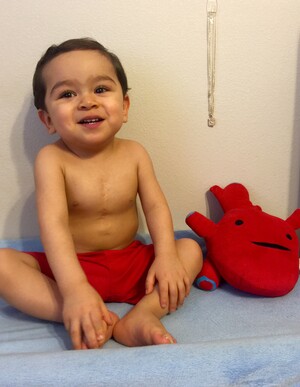- Adult Heart DiseaseDiseases of the arteries, valves, and aorta, as well as cardiac rhythm disturbances
- Pediatric and Congenital Heart DiseaseHeart abnormalities that are present at birth in children, as well as in adults
- Lung, Esophageal, and Other Chest DiseasesDiseases of the lung, esophagus, and chest wall
- ProceduresCommon surgical procedures of the heart, lungs, and esophagus
- Before, During, and After SurgeryHow to prepare for and recover from your surgery
December 12, 2016

Has your child been diagnosed with a congenital heart defect and surgery is recommended for repair of the defect? Maybe your child is only 6 months old and you are worried that he/she could pull out the important lines and tubes after surgery. How will the medical team know if your child is hurting, since he/she is too young to tell us? Or maybe your child is 6 years old and you are not sure if you should tell him/her what is going to happen. Will that just make your child anxious and scared? Perhaps your child is 12 years old and angry that you are going to let the surgeons operate on him/her. How could you? You are supposed to be a protector, after all!

It can be overwhelming trying to prepare yourself for your child’s surgery, much less prepare your child for what he/she is about to go through. Here are a few thoughts on ways to prepare for surgery day and recovery.
Do your research, including looking at the hospital’s surgery outcomes and experience. Write down questions you don’t want to forget to ask. You are your child’s advocate, so no question is too silly. Asking hard questions now could help you have peace of mind at the time of surgery.
I recommend allowing your child to be present for the consultation. He/she may be playing or otherwise seem distracted while the discussion is going on, but children often are listening and curious. Ideally, the surgeon will talk with your child if he/she is age appropriate and offer to answer any of his/her questions. I have often suggested that a child who uses a mobile device, write down all of his/her questions in the phone or tablet and bring the list to the hospital. This helps to make sure that I answer all of the child’s questions before surgery. I’ve had pre-teen children pull up their lists from their phones and ask great questions such as:
- How long have you been a surgeon?
- How many of this particular surgery have you done?
- How many patients have died after you have operated on them?
On the other hand, I’ve had a child who was so angry at the hand that had been dealt to her, that she refused to hear anything of the details directly, would not speak to me, and had a very difficult time overall. We slowed down the timeline of the surgery and gave her time to process. I noticed that very child was listening intently while pretending not to during the consultation. Interestingly, she went to a museum prior to surgery that held an exhibit displaying the human anatomy. During her post-operative check-up, she gave me pictures she drew of “her heart,” from what she learned at the exhibit.

In my experience, children do better when they’ve been informed at an age- appropriate level regarding what surgery is, why they need it, and what to expect afterward. I have witnessed children who were sheltered from the real reason they were at the hospital have a harder time coping after surgery and have more days of being angry or upset. In contrast, children who have been engaged in conversation and included in discussions seem to better cope with the post-operative course and are better at verbalizing their needs. This advice won’t apply to every child, but it will apply to the majority. You, as the parent, must ultimately do what you think is best for your child.
I encourage you to ask your surgeon or surgical team if they have a Child Life specialist or someone trained in child development at your hospital. If they are available, I highly recommend that the specialist be involved in helping you introduce the idea of surgery and explaining what to expect the day of the operation and throughout recovery. This conversation should be at your child’s age-appropriate level. The specialists often have picture books and dolls to help show your child what to expect to see when he/she wakes up from surgery. The specialists are also a supportive presence during the hospitalization to help your child cope with any painful or anxiety-provoking procedures, such as IV placement, chest tube removal, etc.
On a more practical note, a few more things you can do to prepare your child for surgery:
- It is important to find out if any of the medications your child is taking should be stopped before surgery and for how long.
- Take a tour of the Intensive care unit (ICU) and the post-operative hospital wards, where your child will recover after surgery. It is helpful to familiarize yourself with the hospital and its resources in advance, so on the day of the surgery, you are more comfortable with your surroundings.
- You’ll want to bathe your child the evening before surgery, concentrating on the chest and side areas. Your surgeon may recommend an antibacterial soap or special wipes.
- It is important that your child be as comfortable as possible during his/her hospital stay. Pack a “comfort” item or two, such as a favorite blanket, toy, or pillow. Other items that help pass the time include a small book, tablet, favorite music player with earphones, eyeglasses, toothbrush, and schoolwork.Once your child is out of the ICU, he/she may want to wear pajamas from home (ones that button in the front work best).
- Keep your child away from anyone who is sick in the weeks prior to surgery. If the surgery is elective (not emergency) and your child is sick, it is better to postpone surgery in order to avoid unnecessary complications in the recovery period.
Remember, we are all here for your child and your family. We want this to be as good of an experience as possible. We welcome your questions. Heart surgery is perhaps one of the most important investments in your child’s future that you can make. We are all part of the team that is in your child’s corner, rooting him/her on toward recovery.

Read more about congenital heart surgery in the Pediatric and Congenital Heart Disease section, and about preparing for surgery in Before, During, and After Surgery.
The opinions expressed in this article are those of the author and do not necessarily reflect the views of The Society of Thoracic Surgeons.

